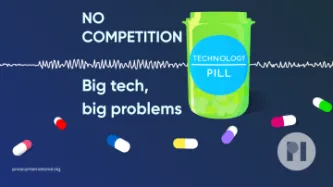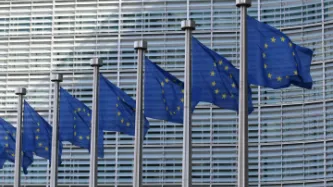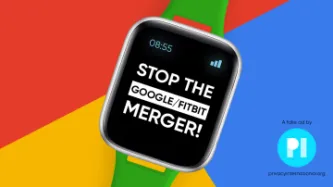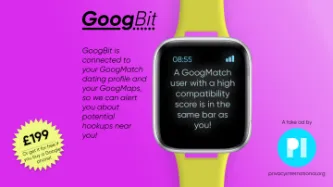Search
Content type: Long Read
INTRODUCTION
In recent years, major tech platforms have been rapidly evolving their business models. Despite their dominance in various markets, tech giants like Google and Meta are venturing into new territories to expand their user base. One of the most striking ventures has been their foray into the "connectivity market" through substantial, and occasionally unsuccessful, investments in network infrastructure.
Many tech companies are investing resources into network infrastructure, either…
Content type: Video
Since we recorded this podcast there has been an update on the Microsoft Activision mergerLinksPI competition page (our "very influential work")More about Dr MantzariEcosystems and competition law in theory and practice - a research paper about ecosystemsPower Imbalances in Online Marketplaces: At the Crossroads of Competition Law and Regulation - one of Dr Deni's papers looking at peconomic dependence in online marketplacesGoogle Android European court case on abuse of dominance and more info…
Content type: Advocacy
Background
In August 2022, Amazon announced that they had entered into a definitive merger agreement to acquire iRobot, a company that specialises in designing and building consumer robots. The transaction was formally notified to the European Commission on 1 June 2023, while the UK Competition and Markets Authority (CMA) has already launched an investigation into the transaction since April 2023.
We believe that this acquisition is likely to significantly impede effective competition in and…
Content type: Video
Quick corrections!
GDPR compensation is in theory possible through court action
GDPR Article 80(2) not Section 20 something as I stated!
Links
Cory's website
Chokepoint Capitalism coauthored with Rebecca Giblin
Giphy and Meta
Chokepoint Capitalism: the audiobook
How to leave dying social media platforms (without losing your friends)
Cory on Mastodon: https://mamot.fr/@doctorow and https://mamot.fr/@pluralistic
PI on Mastodon
Crad Kilodney documentary
Algorithms…
Content type: Press release
Meta, the largest provider of social media sites and display advertising in the UK, acquired GIPHY, the largest provider of GIFs. In its report of 30 November 2021 the CMA found that the completed merger between Meta and GIPHY will give rise to a substantial lessening of competition.
The CAT confirmed the CMA's assessment and dismissed all but one of Meta’s appeal grounds, paving the way for Meta to sell GIPHY, as demanded by the CMA.
PI was granted permission to intervene in this case, one of…
Content type: Report
El informe se basa en investigación documental y empírica (cualitativa y cuantitativa) realizada por Privacy International (PI) en 2021. Más concretamente, PI envió una encuesta a varios reguladores antimonopolio y a organizaciones de la sociedad civil con sede y/o que operan en diversas partes del mundo.
Las preguntas planteadas a los reguladores y a la sociedad civil versaron sobre su trabajo en la economía digital. Se preguntó a los reguladores y a las OSC si incorporaban consideraciones…
Content type: Report
The report builds on both desk and empirical (qualitative and quantitative) research that was carried out by Privacy International (PI) in 2021. Specifically, PI sent out a survey to several antitrust regulators and CSOs based and/or operating in various parts of the world. The questions posed to regulators and civil society revolved around their work in the digital economy. Regulators and CSOs were asked to comment on whether and how personal data considerations were incorporated into their…
Content type: Advocacy
Privacy International (PI) welcomes the aim of the Digital Markets Act (DMA) to address some of the challenges posed by the way the current digital markets operate. As we noted in our preliminary assessment, the proposal put forward by the European Commission in December 2020 contains some shortcomings that need to be addressed, if the DMA were to be effective in tackling these challenges. Some of these shortcomings have been addressed, particularly by the European Parliament in its resolution…
Content type: Press release
Today, following an in-depth investigation, the UK Competition and Market Authority (CMA) assessed that the competition concerns can only be addressed by Facebook selling Giphy in its entirety. This is a very significant decision. Facebook, the largest provider of social media sites and display advertising in the UK, acquired Giphy, the largest provider of GIFs. The merger would further increase Facebook’s dominance and Facebook would have benefitted from Giphy’s data collection practices and…
Content type: Advocacy
The UK government proposes to establish a dedicated Digital Markets Unit to implement and enforce the new pro-competition regime for digital markets. The Digital Markets Unit will be responsible for designating companies with 'Strategic Market Status', overseeing a mandatory code of conduct for those companies and implementing pro-competitive interventions
The way digital marketplaces are shaped has a tremendous impact on human rights. However, this perspective is not always sufficiently…
Content type: Advocacy
As part of a package of measures aimed at addressing the challenges posed by big tech companies, the European Commission proposed a Digital Markets Act, whose intended aim is “to allow end users and business users alike to reap the full benefits of the platform economy and the digital economy at large, in a contestable and fair environment.”
The proposal contains provisions that could benefit individuals as they engage with services provided by big tech companies ('gatekeepers' in the language…
Content type: Advocacy
Background
Giphy is a searchable database for Graphic Interchange Format (‘GIF’) files, stickers, emojis, text, videos and Arcade (remixable video games). This database can be queried through the Giphy search engine, either via its main website (giphy.com), its API or its SDK. Content obtained can then be shared via their URL or be integrated in another service such as a website or an app. Well known integrations of Giphy include messaging services like Whatsapp, Slack,…
Content type: Long Read
Now more than ever with a global pandemic happening, our lives are being shaped by our interaction with the digital world. Work meetings on Zoom followed by Skype with family before a quick run with your favourite running app and a Google search for your next meal: technologies and services offer us a lot and greatly improve our daily lives. But what's the real cost of these tools we rely on so much?
A lot of these companies, especially those offering free services, collect data about you. It…
Content type: News & Analysis
In the US, the Federal Trade Commission and various states attorneys general have opened investigations against alleged anti-competitive practices of Facebook and Google, while demands for stronger regulation both in anti-trust and privacy laws are growing. The EU has unveiled its twin proposed legislation, the Digital Services Act and the Digital Markets Act, aimed at increasing the responsibilities of big platforms and seeking to address the power imbalance they have over other businesses and…
Content type: News & Analysis
Today, the European Commission has concluded its Phase II in-depth review of the proposed acquisition of the health and fitness tracker Fitbit by Google, deciding that the merger can go through. While we welcome the commitments put forward by Google to mitigate some risks of compromising individuals' rights and competition, PI considers the effects of this merger will further strengthen Google's capacity to exploit our data.
On 15 June 2020, Google formally notified the European Commission of…
Content type: Advocacy
An interoperability requirement for “gatekeeper” firms would:
give a fair chance for competition on the merits of new services.
contribute to meeting the three key objectives of the Commission’s February 2020 Digital Future Communication: ensuring technology works for people; a fair and competitive economy and an open, democratic and sustainable society.
As the letter notes, "major digital competition reviews over the last two years [...] have recommended interoperability requirements.…
Content type: Advocacy
International data transfers are an important feature of the present-day global economy. However, when crossing borders, data should also be accompanied by strong and effective privacy and personal data protections. Laws, such as the General Data Protection Regulation (GDPR), play an important role in ensuring data flows respect with privacy.
Trade negotiations that cover cross-border data flows can complicate this. All 80 countries that are part of digital trade negotiations should be able to…
Content type: Long Read
An edited version of this article was originally published on the EDRi website in September 2020.
Introduction
Monopolies, mergers and acquisitions, anti-trust laws. These may seem like tangential or irrelevant issues for privacy and digital rights organisations. But having run our first public petition opposing a big tech merger, we wanted to set out why we think this is an important frontier for people's rights across Europe and indeed across the world.
In June, Google notified the…
Content type: Explainer
The lead author of this piece is Elettra Bietti, a doctoral student at Harvard Law School and volunteer for Privacy International
Network effects
Social media companies and other digital business models are driven by so-called network effects. A network effect (also called a network externality) is a service’s propensity to improve functionally as the number of people using it and the amount of data collected through it increases. For example, as the number of Facebook users increases, Facebook…
Content type: News & Analysis
No doubt this is turning out to be a summer full of news about internet companies' digital dominance.
In June, Google notified the European Commission of its plan to acquire Fitbit - a plan that we immediately identified would raise grave concerns for our well-being as consumers.
Today the European Commission has made its decision. And it's good news.
The European regulator has decided to undertake a detailed 'Phase 2' investigation, rather than just green light Google's plans, voicing also the…
Content type: Advocacy
Introduction
In February 2020, the Australian Competition and Consumer Commission (ACCC) commenced an investigation into the proposed acquisition of Fitbit by Google, which was originally announced in November 2019.
In March 2020, we made a submission to the ACCC, arguing that the acquisition would very likely have onerous implications for both consumers and markets. We asked the Australian regulator to apply strict scrutiny and not let hisory once again repeat itself. We concluded that the…
Content type: Long Read
Monday, 16 June 2025
It’s 7:33 am. Lila’s GoogBit watch vibrates. “You got 6 hours and 57 minutes of sleep last night, including 2 hours and 12 minutes of deep sleep”, the watch reads. “In total, you tossed and turned for 15 minutes only”. Taking into account Lila’s online browsing activity, her sleep pattern, the recent disruptions in some of her other biorhythms, as well as her daily schedule, GoogBit watch has calculated the very best minute to wake her up.
Content type: Call to Action
Google wants to know everything about you.
It already holds a massive trove of data about you, but by announcing its plans to acquire the health and fitness tracker company Fitbit, it now clearly wants to get its hands on your health too. We don’t think any company should be allowed to accumulate this much intimate information about you. This is why we’re trying to stop its merger with Fitbit.
Google and Fitbit need the European Commission’s approval before they can merge. The merger would…
Content type: News & Analysis
Yesterday, Amazon announced that they will be putting a one-year suspension on sales of its facial recognition software Rekognition to law enforcement. While Amazon’s move should be welcomed as a step towards sanctioning company opportunism at the expense of our fundamental freedoms, there is still a lot to be done.
The announcement speaks of just a one-year ban. What is Amazon exactly expecting to change within that one year? Is one year enough to make the technology to not discriminate…
Content type: News & Analysis
This week, we read that a former Apple contractor who blew the whistle on the company’s programme to listen to users’ Siri recordings has decided to go public, in protest at the lack of action taken as a result of the July 2019 disclosures. The news adds to a series of revelations that have been reported over the past months.
While the issue raises serious questions regarding the compatibility of such practices with data protection laws, at the same time, it highlights a wider problem that…
Content type: Long Read
Photo by Cade Roberts on Unsplash
For those of you who don't spend the most productive part of your day scanning the news for developments about data and competition, here's what has been going on in the UK since summer 2019.
Basically, the UK competition authority started an investigation into online platforms and digital advertising last summer, and issued their preliminary findings in December 2019, concluding that Facebook and Google are very powerful in the search engine and social media…
Content type: Advocacy
For a long but fun analysis of the current competition and data state of play in the UK, click here.
Background
PI broadly welcomes the CMA’s interim findings, many of which correspond with issues of longstanding concern to PI and with the points raised in our response to the CMA’s Statement of Scope.
This includes the indication that Google and Facebook have a dominant or strategic position in major elements of the digital advertising market which can -at least, partially- be attributed to the…






















